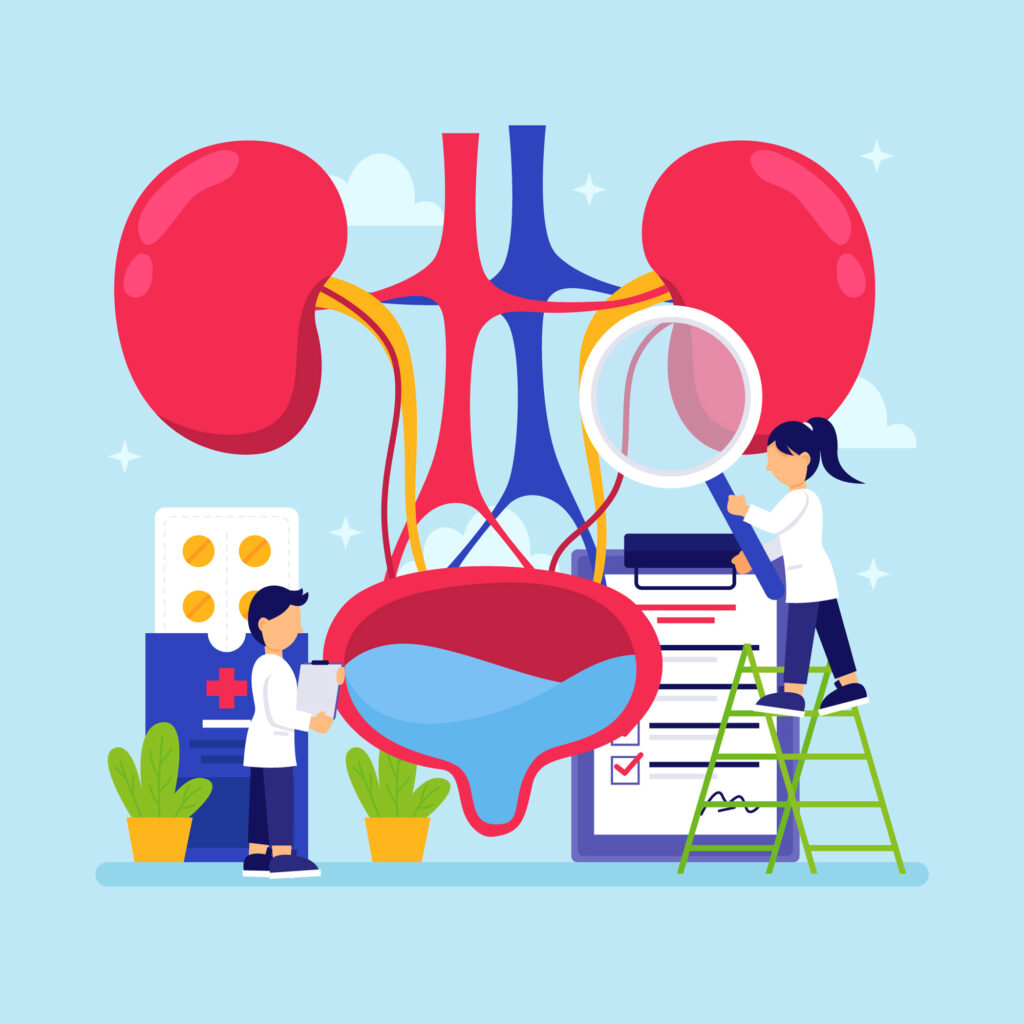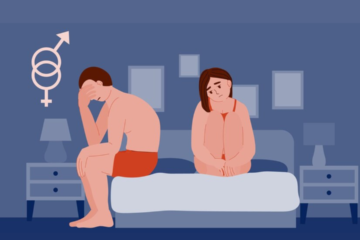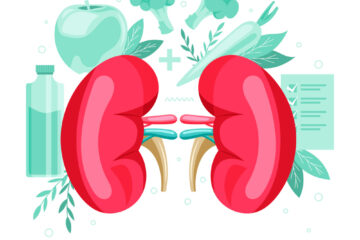
Chronic kidney disease means that your kidneys are not working as well as they once did. Various conditions can cause chronic kidney disease. Severity can vary but most cases are mild or moderate, occur in older people, do not cause symptoms and tend to become worse gradually over months or years.
What is chronic kidney disease?
Chronic kidney disease (CKD) means that your kidneys are diseased or damaged in some way, or are ageing. As a result, your kidneys may not work as well as they used to. A range of conditions can cause chronic kidney disease.
Chronic means ongoing, persistent and long-term. It does not mean severe as some people think. You can have a mild chronic disease. Many people have mild CKD.
Chronic kidney disease used to be called chronic renal failure but chronic kidney disease is a better term, as the word failure implies that the kidneys have totally stopped working. In most cases of chronic kidney disease, this is not so. In most people who have chronic kidney disease there is only a mild or moderate drop in kidney function, which usually does not cause symptoms, and the kidneys have not ‘failed’.
Acute kidney injury (AKI) occurs when the function of the kidneys is rapidly affected – over hours or days. For example, the kidneys may go into acute kidney injury if you have a serious blood infection which can affect the kidneys. This is in contrast to chronic kidney disease where the decline in function of the kidneys is very gradual – over months or years.
How is chronic kidney disease diagnosed?
Kidney function is assessed using a combination of:
- A blood test called the estimated glomerular filtration rate (eGFR); and
- A measure of the amount of protein in the urine (proteinuria).
- A blood test for kidney function
- Ultrasound KUB region
Increased protein in the urine and decreased eGFR are both associated with an increased risk of progressive chronic kidney disease.
Estimated glomerular filtration rate (eGFR)
A normal eGFR is 90 ml/minute/1.73 m or more. If some of the glomeruli do not filter as much as normal, then the kidney is said to have reduced or impaired kidney function.
The eGFR test involves a blood test which measures a chemical called creatinine. Creatinine is a breakdown product of muscle. Creatinine is normally cleared from the blood by the kidneys. If your kidneys are not working very well and the glomeruli are not filtering as much blood as normal, the level of creatinine in the blood goes up.
The eGFR is calculated from your age, sex and blood creatinine level. An adjustment to the calculation is needed for people with African-Caribbean origin. See the separate leaflets called Routine Kidney Function Blood Test and Estimated Glomerular Filtration Rate (eGFR).
Proteinuria
Proteinuria means that your urine contains an abnormal amount of protein. Most proteins are too big to pass through the kidneys’ filters and get into the urine. However, we all leak tiny amounts of a small protein called albumin into our urine.
If a kidney is damaged, then increased amounts of albumin and other larger proteins from our blood can pass into the urine. This abnormal amount of protein in the urine is known as proteinuria. The amount of proteinuria is a good indicator of the extent of kidney damage. Proteinuria is also associated with an increased risk of the development of heart and blood vessel disease.
Proteinuria is usually first detected by a simple dipstick urine test. The amount of proteinuria is then usually measured by a sample of urine sent to the laboratory to measure the ratio of the level of either albumin or total protein in the urine compared with the amount of creatinine in the urine.
A lower level of excess protein in the urine is called microalbuminuria.
What are chronic kidney disease symptoms?
You are unlikely to feel unwell or have symptoms with mild-to-moderate chronic kidney disease – that is, stages 1 to 3. (However, there may be symptoms of an underlying condition such as kidney pain with certain kidney conditions.) Chronic kidney disease is usually diagnosed by the eGFR test before any symptoms develop.
Symptoms tend to develop when chronic kidney disease becomes severe (stage 4) or worse. The symptoms at first tend to be vague and nonspecific, such as feeling tired, having less energy than usual and just not feeling well. With more severe chronic kidney disease, symptoms that may develop include:
- Difficulty thinking clearly.
- A poor appetite.
- Weight loss.
- Dry, itchy skin.
- Muscle cramps.
- Fluid retention which causes swollen feet and ankles.
- Puffiness around the eyes.
- A need to pass urine more often than usual.
- Being pale due to anaemia.
- Feeling sick.
If the kidney function declines to stage 4 or 5 then various other problems may develop – for example, anaemia and an imbalance of calcium, phosphate and other chemicals in the bloodstream. These can cause various symptoms, such as tiredness due to anaemia, and bone thinning or fractures due to calcium and phosphate imbalance. End-stage kidney failure (stage 5) is eventually fatal unless treated.
How common is chronic kidney disease?
About 1 in 10 people have some degree of chronic kidney disease. It can develop at any age and various conditions can lead to CKD. It becomes more common with increasing age and is more common in women.
Although about half of people aged 75 or more have some degree of chronic kidney disease, most of these people do not actually have diseases of their kidneys; they have normal ageing of their kidneys.
Most cases of CKD are mild or moderate (stages 1-3).
What causes chronic kidney disease?
A number of conditions can cause permanent damage to the kidneys and/or affect the function of the kidneys and lead to chronic kidney disease. Three common causes, which probably account for about three in four cases of chronic kidney disease in adults, are:
- Diabetes: Diabetic kidney disease is a common complication of diabetes.
- High blood pressure: Untreated or poorly treated high blood pressure is a major cause of CKD. However, CKD can also cause high blood pressure, as the kidney has a role in blood pressure regulation. About nine out of ten people with CKD stages 3-5 have high blood pressure.
- Ageing kidneys: There appears to be an age-related decline in kidney function. About half of people aged 75 or more have some degree of CKD. In most of these cases, the CKD does not progress beyond the moderate stage unless other problems of the kidney, such as diabetic kidney disease, develop.
- Certain medications: Medications including non-steroidal anti-inflammatory drugs (if they are used long-term, especially at high doses); lithium, ciclosporin and tacrolimus. If you are taking one of these medicines, you should have a blood test to check your kidney function at least once a year
Other less common conditions that can cause chronic kidney disease include:
- Diseases of the tiny filters in the kidneys (glomeruli), such as inflammation of the glomeruli (glomerulonephritis).
- Narrowing of the artery taking blood to the kidney (renal artery stenosis)
- Polycystic kidney disease. See the separate leaflet called Polycystic Kidney Disease.
- Blockages to the flow of urine, and repeated kidney infections.
- Previous injury to your kidney. If you have an acute kidney injury, you should be followed up for at least three years to check your kidney function.
- Having only one functioning kidney. Even though most people with a single kidney do not have any problems, your doctor will want to keep an eye on your kidney function.
Preventing or slowing down the progression of chronic kidney disease
There are ways to stop chronic kidney disease becoming any worse or to slow down any progression. You should have check-ups every now and then by your doctor or practice nurse to monitor your kidney function – the eGFR test. They will also give you treatment and advice on how to prevent or slow down the progression of CKD. This usually includes:
- Blood pressure control. The most important treatment to prevent or delay the progression of chronic kidney disease, whatever the underlying cause, is to keep your blood pressure well controlled. Most people with CKD will require medication to control their blood pressure. Depending on the amount of albumin in your urine, your doctor may recommend a target blood pressure level to aim for of below 140/90 mm Hg or 130/80 mm Hg, and even lower in some circumstances. For children and young people with CKD and high levels of albumin in the urine, blood pressure should be kept less than average for their height.
- Review of your medication. Certain medicines can affect the kidneys as a side-effect which can make CKD worse. For example, if you have CKD you should not take anti-inflammatory medicines unless advised to by a doctor. You may also need to adjust the dose of certain medicines that you may take if your CKD gets worse.
- Diet. if you have more advanced CKD (stage 4 or 5) then you will need to follow a special diet
Treating end-stage kidney failure
Only a small number of people with chronic kidney disease progress to end-stage kidney failure (stage 5 CKD) that requires kidney dialysis or kidney transplant. If you reach stage 4 or 5 CKD, you are likely to be referred to a specialist in kidney disease at the hospital.
You will need to attend regularly for follow-up – how often depends on how much your kidney function is affected and how stable your results are. As well as monitoring your kidney function, your team is likely to carry out certain blood tests:
- Full blood count (for anaemia).
- Calcium.
- Phosphate.
- Vitamin D.
- Parathyroid hormone.
The options for treatment include:
- Haemodialysis – your blood is removed from a vein in your arm, filtered to remove waste products and returned through another tube.
- Peritoneal dialysis – a thin tube is inserted into your stomach near your tummy button. Fluid is pumped into your stomach cavity to filter waste products, and drained into a bag.
- Kidney transplant.



